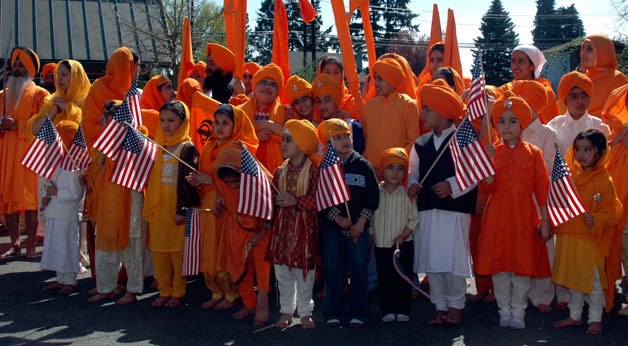MARYSVILLE — “When people think of Marysville, they think of the Tulalip Tribes and the Native Indians,” said Jasbir Sandhu at the Guru Nanak Sikh Temple in Marysville, before laughing, “They don’t think of the other Indians that are here.”
The Guru Nanak Sikh Temple has welcomed members and visitors alike for the past nine years at its current location at 4919 61st St. NE in Marysville, and on May 1, area followers of the Sikh faith converged on the temple to observe Vaisakhi, one of the most significant holidays of the Sikh calendar.
Satwant Pandher, president of the Guru Nanak Sikh Temple committee, explained that Vaisakhi marks the anniversary of the establishment of the Khalsa in India in 1699. The Khalsa refers to the collective body of all baptized Sikhs, which was originally established by Guru Gobind Singh, the tenth Sikh Guru.
“It was a response to the forcible conversion of the Sikhs by the Muslims,” Pandher said. “It was the official birth of the Sikh religion as it exists today.”
Pandher acknowledged that Sikhs are sometimes mistaken for Muslims, but he emphasized that Sikhism and Islam are entirely different religions.
Vaisakhi is preceded by the continuous reading of the Guru Granth Sahib, the holy scripture of Sikhism, for 48 hours, after which Sikhs from throughout the Puget Sound region came to the Guru Nanak Sikh Temple in Marysville to sing hymns, make offerings, partake of free meals, and share conversation and fellowship. On the temple’s ornately decorated upper floor, priests spoke to attendees about the historic importance of the occasion, while children recited from essays they’d written, some in the Punjabi language, reflecting on their cultural heritage.
The temple is open to anyone, Sikh and non-Sikhs alike, who removes their shoes and dons scarves, bandanas or other head covers upon entering. According to Pandher, the all-volunteer kitchen on the temple’s ground floor reflects the Sikh commitment to hospitality and charity as much as the ceremonial changing of the Nishan Sahib, the Sikh holy flag, and the Chola, the cloth covering its flagpole.
“When travelers saw the flag on a temple, they knew they would find free food and shelter for a few days there,” said Pandher, as diners sat on rugs and received regular refills of traditional Indian curry dishes from servers. “We are a very peaceful people. We believe in being self-sufficient, so we don’t go on welfare, and we try to get our citizenship as soon as possible. About 70 percent of the members of our temple are U.S. citizens.”
“Our faith fights for others,” Marysville’s Parminder Dhaliwal said. “We’re here for all cultures and all religions.”
“Everyone is welcome here, no matter what their religion,” said Gagan Manhas, an 18-year-old Marysville-Pilchuck High School graduate who’s now attending the University of Washington. “We don’t persecute anyone for their beliefs.”
Fellow Marysville resident Suman Dhillon proudly described her fellow Sikhs are “brave people who help others,” while Arlington’s Sukhpal Bhangoo appreciates her fellow Sikhs or being “very kind people who are always forgiving. We have a lot of history.” Bhangoo’s children have learned some of that history in Punjabi classes at the Guru Nanak Sikh Temple.
“It’s a way of keeping in touch with my culture,” said Mandeep Sran of Marysville, before the temple’s flagpole was washed with milk and water. “I live in a different country, but I don’t want to forget where I came from. At the same time, I meet all kinds of different people here.”



